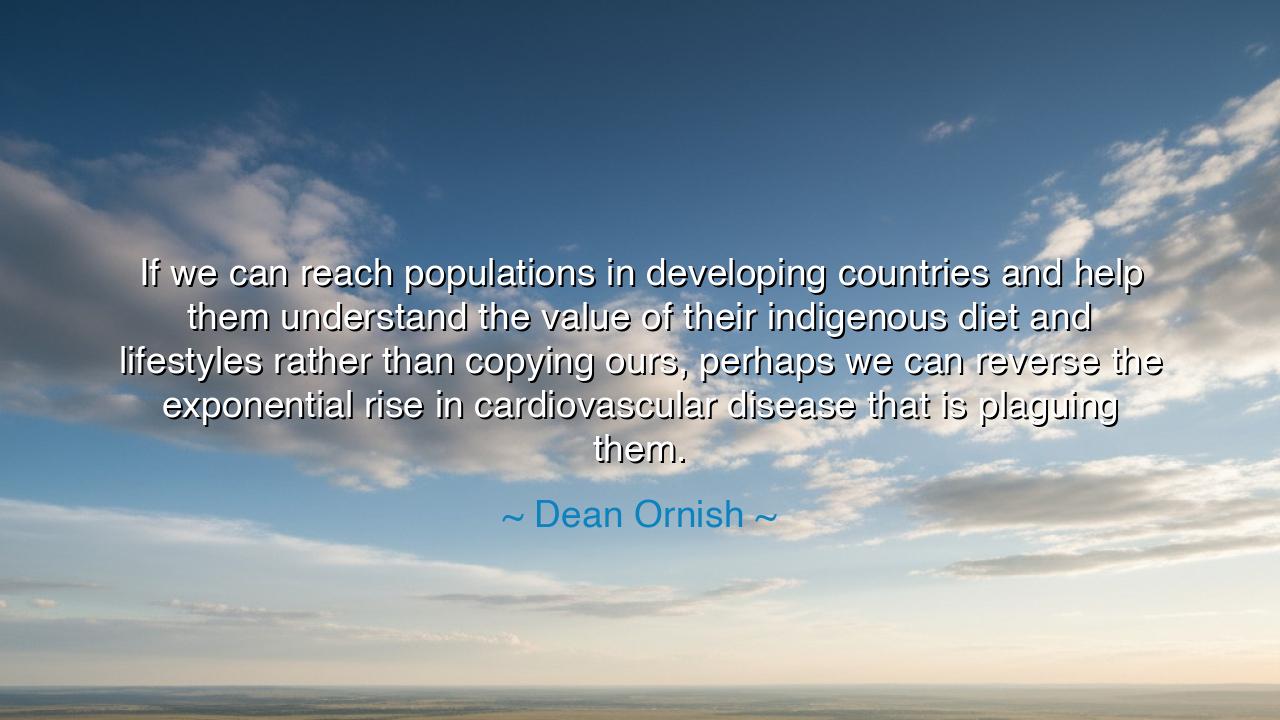
If we can reach populations in developing countries and help them
If we can reach populations in developing countries and help them understand the value of their indigenous diet and lifestyles rather than copying ours, perhaps we can reverse the exponential rise in cardiovascular disease that is plaguing them.






In the words of Dean Ornish, healer of both body and spirit, there rings a warning and a hope for all humankind: “If we can reach populations in developing countries and help them understand the value of their indigenous diet and lifestyles rather than copying ours, perhaps we can reverse the exponential rise in cardiovascular disease that is plaguing them.” Beneath these words lies not merely a lesson in medicine, but a call to remember who we are—to cherish the ancient wisdom written not in books, but in the patterns of nature and the rhythms of the earth. For the tragedy of modern civilization is not only what it creates, but what it forgets.
Once, the people of every land ate from the soil that sustained them. Their food was born of sunlight, rain, and tradition—grains grown by patient hands, fruits gathered in season, spices that healed as they delighted. These diets, formed over centuries, were not inventions of science but gifts of harmony—ways of living that aligned body and spirit with the land. Yet as the tides of modernization swept across the world, many abandoned these gifts, seduced by the false glitter of industrial abundance: refined sugar, processed meats, and the illusion that more is better. Ornish’s words mourn this loss, for he knows that in chasing the Western way, many have traded vitality for convenience, and inherited the diseases of excess.
History, too, tells this tale. When Western habits spread to islands once untouched by such customs, the transformation was swift and cruel. In the islands of the Pacific, once home to lean, strong peoples who lived on fish, taro, and coconut, the arrival of imported foods—white bread, tinned meat, and sugary drinks—brought an epidemic not of war, but of sickness. Within a generation, obesity and heart disease surged like a dark tide, washing away the strength of old ways. Yet the healing lay not in new discoveries, but in remembering the old—the foods of their ancestors, the walks upon their shores, the simplicity of life once lived close to the earth.
The origin of Ornish’s insight comes from years of tending to the hearts of the suffering—not just their physical hearts, but the deeper one that beats in all humanity. He saw that the richest nations were often the sickest, and that progress, untempered by wisdom, leads to imbalance. His vision is not to impose, but to restore—to remind the peoples of every land that their indigenous diets and lifestyles already hold the key to health. The rice and lentils of the East, the maize and beans of the Americas, the olive oil and grains of the Mediterranean—all these are threads in a tapestry of natural intelligence, woven long before laboratories named their virtues.
Yet Ornish’s words are more than scientific—they are moral and spiritual. For they ask us to respect the heritage of others, not to replace it with our own. The imitation of the West is not merely a dietary tragedy; it is a loss of cultural dignity, a forgetting of the sacred bond between people and their land. To honor indigenous ways is to honor balance itself—to see that health is not sold in stores but cultivated in families, kitchens, and fields. It is an act of humility: to learn from the past, to listen to those who still remember the wisdom of the soil.
Let this teaching, then, be passed to all who hunger for meaning as well as nourishment: Return to simplicity. Eat not what is most convenient, but what is most natural. Value the foods that grow where you live, for they are shaped for your body and spirit. Teach your children the recipes of their ancestors, for in them lies a map to long life. And when you see another culture striving to become “modern,” remind them gently that true progress is not found in imitation, but in preservation.
For the heart of the world, like the human heart, grows ill when it forgets its roots. The cure is not in more invention, but in remembrance—a remembering of balance, reverence, and gratitude. Dean Ornish’s message is thus a call to awaken: to cherish the wisdom of our forebears, to honor the bounty of the earth, and to heal both body and spirit by returning to the ways that once kept us whole. For in the end, the path forward may well be the path back—to the simple, sacred harmony our ancestors knew so well.






AAdministratorAdministrator
Welcome, honored guests. Please leave a comment, we will respond soon